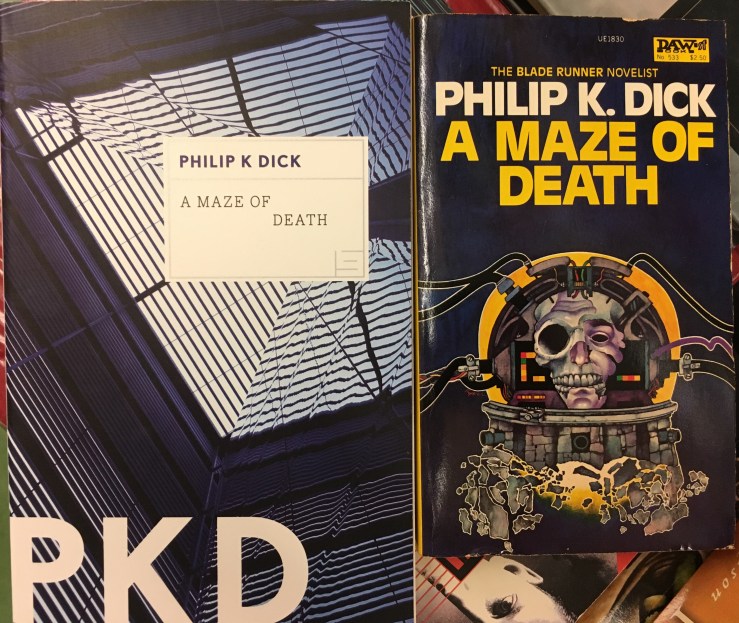“Cadbury, the Beaver Who Lacked”
by
Philip K. Dick
Once, long ago, before money had been invented, a certain male beaver named Cadbury lived within a meager dam which he had constructed with his own teeth and feet, earning his living by gnawing down shrubs, trees and other growth in exchange for poker chips of several colors. The blue chips he liked best, but they came rarely, generally only due in payment for some uniquely huge gnawing-assignment. In all the passing years of work he had owned only three such chips, but he knew by inference that more must exist, and every now and then during the day’s gnawing he paused a moment, fixed a cup of instant coffee, and meditated on chips of all hues, the blues included.
His wife Hilda offered unasked-for advice whenever the opportunity presented itself. “Look at you,” she customarily would declare. “You really ought to see a psychiatrist. Your stack of white chips is only approximately half that of Ralf, Peter, Tom, Bob, Jack and Earl, all who live and gnaw around here, because you’re so busy woolgathering about your goddam blue chips which you’ll never get anyhow because frankly if the blunt truth were known you lack the talent, energy and drive.”
“Energy and drive,” Cadbury would moodily retort, “mean the same thing.” But nevertheless he perceived how right she was. This constituted his wife’s main fault: she invariably had truth on her side, whereas he had nothing but hot air. And truth, when pitted against hot air in the arena of life, generally carries the day.
Since Hilda was right, Cadbury dug up eight white chips from his secret chip-concealing place — a shallow depression under a minor rock — and walked two and three-quarters miles to the nearest psychiatrist, a mellow, do-nothing rabbit shaped like a bowling pin who, according to his wife, made fifteen thousand a year and so what about it.
“Clever sort of day,” Dr. Drat said amiably, unrolling two Tums for his tummy and leaning back in his extra-heavily padded swivel chair.
“Not so very darn clever,” Cadbury answered, “when you know you don’t have it in you ever to catch sight of a blue chip again, even though you work your ass off day in and day out, and what for? She spends it faster than I make it. Even if I did get my teeth in a blue chip it’d be gone overnight for something expensive and useless on the installment plan, such as for instance a twelve million candle-power self-recharging flashlight. With a lifetime guarantee.”
“Those are darn clever,” Dr. Drat said, “those what you said there, those self-recharging flashlights.”
“The only reason I came to you,” Cadbury said, “is because my wife made me. She can get me to do anything. If she said, ‘Swim out into the middle of the creek and drown,’ do you know what I’d do?”
“You’d rebel,” Dr. Drat said in his amiable voice, his hoppers up on the surface of his burled walnut desk.
“I’d kick in her fucking face,” Cadbury said. “I’d gnaw her to bits; I’d gnaw her right in half, right through the middle. You’re damn right. I mean, I’m not kidding; it’s a fact. I hate her.”
“How much,” Dr. Drat asked, “is your wife like your mother?”
“I never had a mother,” Cadbury said in a grumpy way — a way which he adopted from time to time: a regular characteristic with him, as Hilda had pointed out. “I was found floating in the Napa Slough in a shoebox with a handwritten note reading ‘FINDERS KEEPERS.’ ”
“What was your last dream?” Dr. Drat inquired.
“My last dream,” Cadbury said, “is — was — the same as all the others. I always dream I buy a two-cent mint at the drugstore, one of the flat chocolate-covered mints wrapped in green foil, and when I remove the foil it isn’t a mint. You know what it is?”
“Suppose you tell me what it is,” Dr. Drat said, in a voice suggesting that he really knew but no one was paying him to say it.
Cadbury said fiercely, “It’s a blue chip. Or rather it looks like a blue chip. It’s blue and it’s flat and round and the same size. But in the dream I always say ‘Maybe it’s just a blue mint.’ I mean, there must be such a thing as blue mints. I’d hate like to hell to store it in my secret chip-concealing place — a shallow depression under an ordinary-looking rock — and then there’d be this hot day, see, and afterwards when I went to get my blue chip — or rather supposed blue chip — I found it all melted because it really was a mint after all and not a blue chip. And who’d I sue? The manufacturer? Christ; he never claimed it was a blue chip; it clearly said, in my dream, on the green foil wrapper –”
“I think,” Dr. Drat broke in mildly, “that our time is up for today. We might well do some exploring of this aspect of your inner psyche next week because it appears to be leading us somewhere.”
Rising to his feet, Cadbury said, “What’s the matter with me, Dr. Drat? I want an answer; be frank — I can take it. Am I psychotic?”
“Well, you have illusions,” Dr. Drat said, after a meditative pause. “No, you’re not psychotic; you don’t hear the voice of Christ or anything like that telling you to go out and rape people. No, it’s illusions. About yourself, your work, your wife. There may be more. Goodbye.” He rose, too, hippity-hopped to the door of his office and politely but firmly opened it, exposing the tunnel out.
Read the rest of “Cadbury, the Beaver Who Lacked” by Philip K. Dick





